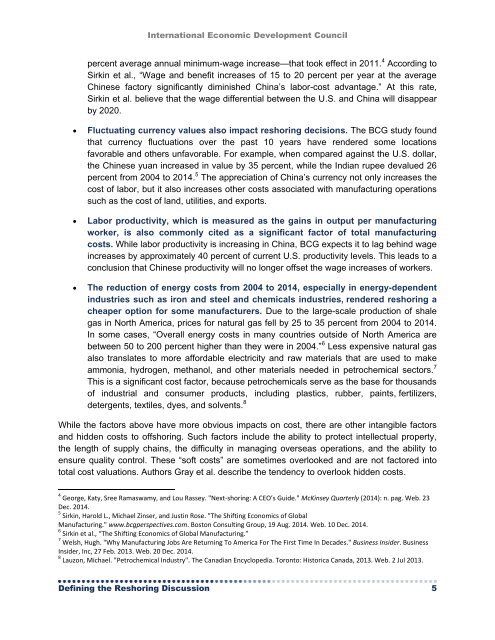DEFINING THE RESHORING DISCUSSION
Reshoring_American_Jobs
Reshoring_American_Jobs
You also want an ePaper? Increase the reach of your titles
YUMPU automatically turns print PDFs into web optimized ePapers that Google loves.
International Economic Development Council<br />
percent average annual minimum-wage increase—that took effect in 2011. 4 According to<br />
Sirkin et al., “Wage and benefit increases of 15 to 20 percent per year at the average<br />
Chinese factory significantly diminished China’s labor-cost advantage.” At this rate,<br />
Sirkin et al. believe that the wage differential between the U.S. and China will disappear<br />
by 2020.<br />
<br />
<br />
<br />
Fluctuating currency values also impact reshoring decisions. The BCG study found<br />
that currency fluctuations over the past 10 years have rendered some locations<br />
favorable and others unfavorable. For example, when compared against the U.S. dollar,<br />
the Chinese yuan increased in value by 35 percent, while the Indian rupee devalued 26<br />
percent from 2004 to 2014. 5 The appreciation of China’s currency not only increases the<br />
cost of labor, but it also increases other costs associated with manufacturing operations<br />
such as the cost of land, utilities, and exports.<br />
Labor productivity, which is measured as the gains in output per manufacturing<br />
worker, is also commonly cited as a significant factor of total manufacturing<br />
costs. While labor productivity is increasing in China, BCG expects it to lag behind wage<br />
increases by approximately 40 percent of current U.S. productivity levels. This leads to a<br />
conclusion that Chinese productivity will no longer offset the wage increases of workers.<br />
The reduction of energy costs from 2004 to 2014, especially in energy-dependent<br />
industries such as iron and steel and chemicals industries, rendered reshoring a<br />
cheaper option for some manufacturers. Due to the large-scale production of shale<br />
gas in North America, prices for natural gas fell by 25 to 35 percent from 2004 to 2014.<br />
In some cases, “Overall energy costs in many countries outside of North America are<br />
between 50 to 200 percent higher than they were in 2004.” 6 Less expensive natural gas<br />
also translates to more affordable electricity and raw materials that are used to make<br />
ammonia, hydrogen, methanol, and other materials needed in petrochemical sectors. 7<br />
This is a significant cost factor, because petrochemicals serve as the base for thousands<br />
of industrial and consumer products, including plastics, rubber, paints, fertilizers,<br />
detergents, textiles, dyes, and solvents. 8<br />
While the factors above have more obvious impacts on cost, there are other intangible factors<br />
and hidden costs to offshoring. Such factors include the ability to protect intellectual property,<br />
the length of supply chains, the difficulty in managing overseas operations, and the ability to<br />
ensure quality control. These “soft costs” are sometimes overlooked and are not factored into<br />
total cost valuations. Authors Gray et al. describe the tendency to overlook hidden costs.<br />
4 George, Katy, Sree Ramaswamy, and Lou Rassey. "Next-shoring: A CEO’s Guide." McKinsey Quarterly (2014): n. pag. Web. 23<br />
Dec. 2014.<br />
5 Sirkin, Harold L., Michael Zinser, and Justin Rose. "The Shifting Economics of Global<br />
Manufacturing." www.bcgperspectives.com. Boston Consulting Group, 19 Aug. 2014. Web. 10 Dec. 2014.<br />
6 Sirkin et al., “The Shifting Economics of Global Manufacturing.”<br />
7 Welsh, Hugh. "Why Manufacturing Jobs Are Returning To America For The First Time In Decades." Business Insider. Business<br />
Insider, Inc, 27 Feb. 2013. Web. 20 Dec. 2014.<br />
8 Lauzon, Michael. "Petrochemical Industry". The Canadian Encyclopedia. Toronto: Historica Canada, 2013. Web. 2 Jul 2013.<br />
Defining the Reshoring Discussion 5


